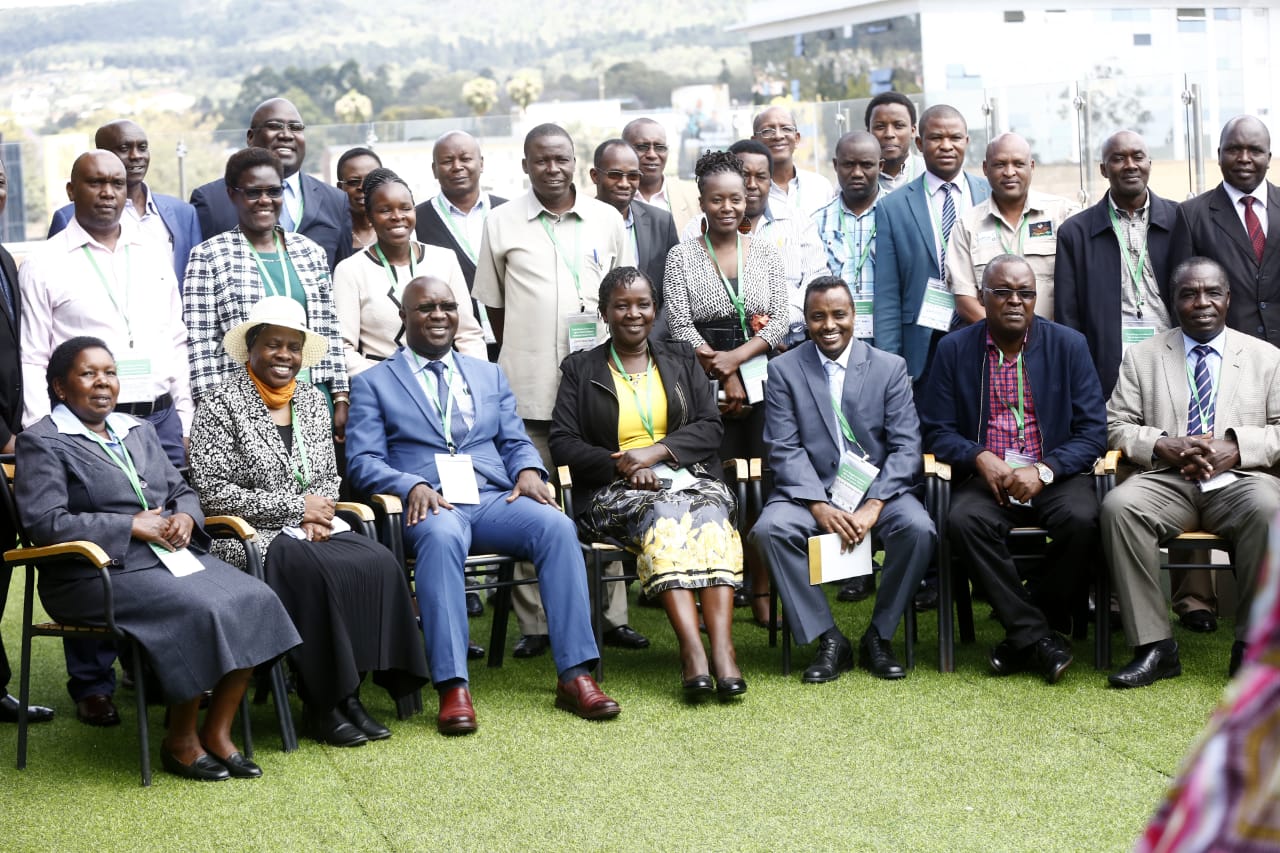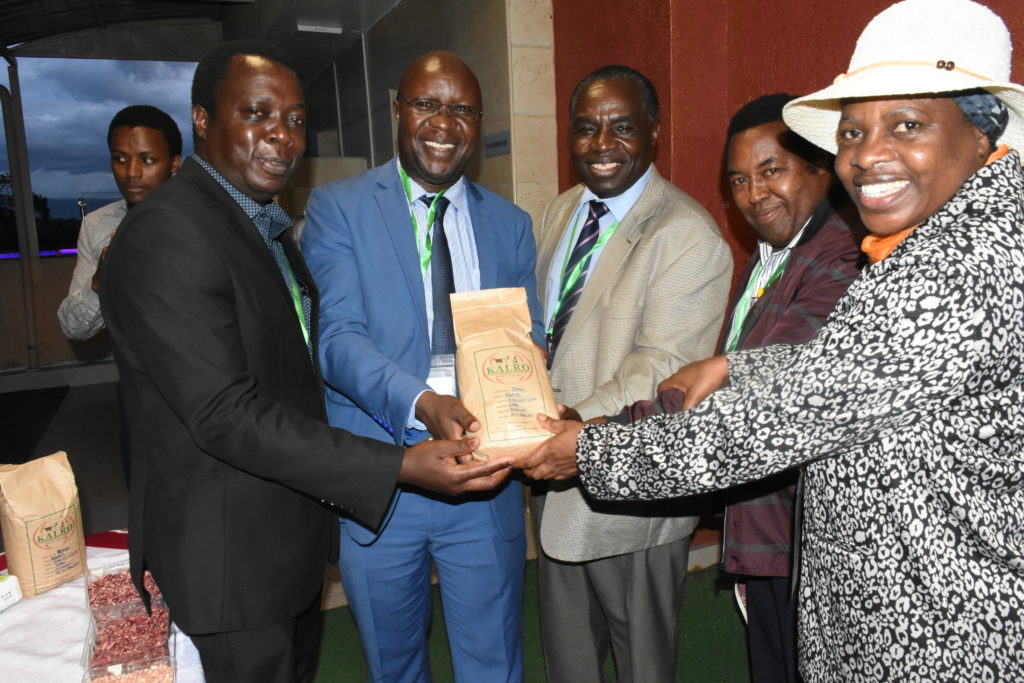Policymakers at the center of High Iron Bean promotion in Kenya
The Big 4 Agenda is at the heart of the President of Kenya, Hon. Uhuru Kenyatta’s flagship projects that will position Kenya as a development-oriented country. Food and nutrition security is one of the pillars the government would like to address as a key priority. According to the Kenya Demographic & Health Survey (KDHS 2014), 26% of children under age 5 are stunted, 4 percent are wasted, and 11 percent are underweight. Malnutrition is a burden of great economic significance in the county.
Agriculture plays a major role in ensuring that a country has access to food. Beyond increasing productivity, there is a need to produce nutrient-dense foods with nutrients such as iron, zinc, and vitamins. Common bean is a major source of protein, iron, and zinc for most rural and urban households and can contribute to reducing iron deficiency especially among women and children under the age of 5 years. Per capita, bean consumption in Eastern Africa is among the highest in the world (western Kenya, Rwanda, and Burundi between 50 – 60 kg per person per year). Common bean has rapidly evolved from traditional subsistence to a modern, market-oriented crop with major impacts on household food and nutritional security, and incomes for the most marginalized communities in Africa. Bean is the most traded commodity among East Africa countries, where Kenya imports 40% of its requirements.
International Center for Tropical Agriculture (CIAT) and partners, through a process of biofortification have developed bush and climbing bean varieties with high iron and zinc content, which if consumed can alleviate anemia and improve cognitive abilities. The high iron beans are now widely adopted in Rwanda benefiting more than 700,000 households. The recent past has seen the release of micronutrient-rich beans in Burundi, DR Congo, Kenya, Malawi, Tanzania, Uganda, and Zimbabwe. In 2017, The Kenya Agriculture and Livestock Research Organization (KALRO) released three micronutrient-rich high iron bean varieties; Angaza, Faida, Metameta, and Nyota. Currently, these varieties are being promoted across the country.
The East African Seed Company Ltd is licensed to market; Angaza, Faida and Metameta varieties. Awareness creation and promotion of large scale production of these nutrient-dense bean varieties across suitable agro-ecologies in the bean growing counties in Kenya are some of the gaps that need to be addressed.
The bean value chain presents great opportunities for meeting the food and nutrition needs of the thousands of rural and urban households in the counties. Bean is a tradeable commodity with high returns relative to maize. They can be used as a substitute or for diversification of the predominantly maize-based systems, which is prone to diseases and failures due to unfavorable climatic conditions. There are many opportunities for developing agribusiness along the bean value chain from production, distribution, trade, processing, and consumption. For example, opportunities to support women and youth groups to invest in bean product development.
Since the 1980s, Kenya has continued to implement the school meals program in collaboration with the World Food Programme (WFP) and the Ministry of Education. In 2009, Kenya launched a Home-Grown School Meals programme as a nationally-owned and Government-led programme. Home-Grown School meals are cash-based, meaning that schools receive a cash allocation each term from the Treasury to buy food for school children from local markets. This model boosts not only school attendance but also local economies and agricultural production, by enhancing local business ecosystems.

County Executives of Agriculture together with stakeholders from KALRO, East Africa Seed Company and Azuri Health Ltd with CIAT team
Agriculture is now a devolved function implemented by the County Governments. As such, counties have a great responsibility of supporting and catalyzing investments to promote the production of nutritious foods. Some counties have prioritized beans in their County Integrated Development Plans as a priority commodity value chain for support. There is a need to support the smallholder farmers to access the right seed, good agricultural practices and agriculture extension and advisory services to make their farming productive and sustainable.
County Investment Dialogue on beans
 The proposed dialogue is an opportunity to explore interest and collaboration with counties to invest in promoting high iron bean production, marketing, and processing for improved nutrition and incomes. The dialogue is convened under the Technologies for Africa Agriculture Transformation (TAAT), a flagship programme funded by the Africa Development Bank (AfDB) as part of the Bank’s Feed Africa Strategy. The focus of the TAAT programme is to build capacities and mechanisms to scale out proven technologies for African agricultural transformation across an initial set of 31 countries in Africa. Kenya is one of the eight (8) countries targeted for large-scale deployment and upscaling of the high iron beans technologies. The discussions will revolve around the following themes: The burden of malnutrition at county level, Nutrition-sensitive agriculture interventions- micronutrient-rich beans (and other crops), Addressing the bean seed, grain production and market access needs, Opportunities for trade, processing and value addition in beans, and Agribusiness opportunities for youth and women around micronutrient-rich beans.
The proposed dialogue is an opportunity to explore interest and collaboration with counties to invest in promoting high iron bean production, marketing, and processing for improved nutrition and incomes. The dialogue is convened under the Technologies for Africa Agriculture Transformation (TAAT), a flagship programme funded by the Africa Development Bank (AfDB) as part of the Bank’s Feed Africa Strategy. The focus of the TAAT programme is to build capacities and mechanisms to scale out proven technologies for African agricultural transformation across an initial set of 31 countries in Africa. Kenya is one of the eight (8) countries targeted for large-scale deployment and upscaling of the high iron beans technologies. The discussions will revolve around the following themes: The burden of malnutrition at county level, Nutrition-sensitive agriculture interventions- micronutrient-rich beans (and other crops), Addressing the bean seed, grain production and market access needs, Opportunities for trade, processing and value addition in beans, and Agribusiness opportunities for youth and women around micronutrient-rich beans.
The dialogue brought together Agriculture County Executive Committees Members (CECs) from 20 bean growing counties in Kenya to dialogue with the private sector and research partners on investment opportunities in high iron beans.
In follow up meeting, the County government of Bungoma has already organized a follow-up meeting that to discuss how best to promote the high iron bean growing for food security and nutrition agenda in the county level. Other counties that have expressed interest include Kisii, Nyamira, Siaya, Busia and Transnzoia counties.

